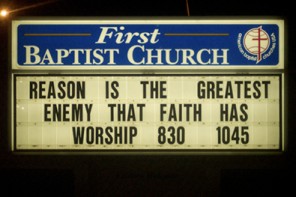A Washington Post blogger on the campaign trail in South Carolina found this:
The brochure being handed out in South Carolina shows a picture of the candidate with his hands together and eyes closed. In large letters, it reads “ANSWERING THE CALL.” Inside, voters learn of a candidate who was “CALLED TO CHRIST” and even larger letters is a “COMMITTED CHRISTIAN” and is quoted as saying, “I believe in the power of prayer.”
A brochure for Mike Huckabee? No. For The Big O. Barack Obama’s campaign is making a big push for black evangelicals in SC. There might be as many of them voting in the Democratic primary as white evangelicals voting in the South Carolina GOP primary, this blog post suggests. Most discussions of the impact of evangelical Christians in the political arena overlook the great voting power—and even greater potential voting power—of evangelicals who vote Democratic. In fact the Edison-Mitofsky exit pollsters in New Hampshire didn’t even bother to ask Dem voters whether or not they were evangelical, though they thought it important to put that question to GOP voters. Numbers I’ve seen suggest that between a quarter and a third of evangelicals may vote Democratic, and given the new political flexibility we are seeing in some evangelical circles, that number is likely to go up. And a significant portion of those evangelical Dem voters are African American.
That’s just one reason that Democratic as well as Republican candidates have been asserting their bona fides as faithful believers, to a greater extent than in any previous presidential election. Believers in what? It hardly matters. The electorate demands that the president just has to be a believer—in almost anything, as long as it seems conventionally “religious.” So candidates, especially Dems, tout their faith as a separate issue, generally without linking it to any specific political issues of the day.
Why? Here’s my take:
In a time when the world seems like a shaky place, you may begin to wonder whether there is any moral order in the universe. Are the very foundations of society so unstable that they might not hold up for long? Words about faith—nearly any words—speak reassuringly to such fears, which haunt millions of Americans.
But in a democracy, there should be no fixed truth except that everyone has the right to offer a new view, and to change his or her mind. It’s a process whose outcome should never be predictable, a process without end. A claim to absolute truth—any absolute truth—stops that process.
In itself, faith in politics poses no great danger to democracy as long as the debates are really about policies. And religious values are translated into political values, articulated in ways that can be rationally debated by people who don’t share them. The challenge is not to get religion out of politics. It’s to get the quest for certitude out of politics.



